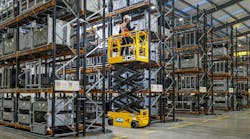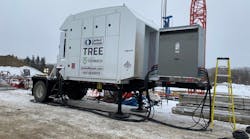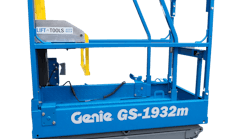Submitted by Joe Parriott, Region Sales Manager Mustang Manufacturing
It's the oldest lesson in construction equipment — invest time and money in preventive maintenance, and you'll save in the end. And it's truer now than ever when one considers the cost to address telehandler damage. That's because it's the rare part that simply needs repair. Most of the time, damaged telehandlers require parts replacement, costing owners both cash and downtime.
Take the common problem of leaking hub seals, for example. Hub seals are located on the planetary wheel drive, and their purpose is to keep lubricant clean for the final drives. There's no repairing these seals once they've begun to leak, and the cost to replace them can run up to $200 per wheel. Maintenance of the drives, which involves changing the hub lubricant every 500 hours at a cost of less than $40 per wheel, can save owners from the downtime and enable close inspection of the seals.
Now let's say the telehandler owner doesn't maintain a good lubricant-changing schedule, and the seals begin to leak. The only way he's going to be aware of the problem is by paying attention to his machine so as to see the leaking fluid upon the inspection process.
The daily walk-around is a basic tenant of every responsible equipment maintenance program. Whether it's a mechanic or an operator, someone should be in charge of checking fluid levels and tire wear and watching out for red flags, such as missing bolts and leaking fluid. This will help keep maintenance and repair costs down tremendously. For instance, if the damaged hub seal goes undetected and the telehandler operator continues as usual, the operator may damage the unit's entire planetary assembly, which could cost up to $2,000 to repair.
Keeping clean fuel and filters in the telehandler are inexpensive methods for preserving the quality and performance of the machine. At a cost of around $20, changing fuel filters frequently (every 150 hours) will avoid the cost of the alternative — excessive engine wear or the need for an entirely new engine.
And while keeping clean fuel in the machine is important, keeping fuel itself in the machine is vital. Sounds simple, doesn't it? But you'd be surprised at how many times a new operator will attempt to start a machine with an empty fuel tank. The cost to replace the starter on a telehandler? Nearly $500. It's much less expensive to train operators on even the simplest of solutions, such as keeping the telehandler's fuel tank full.
Replacing a telehandler engine could cost as much as $10,000. The money required by a good preventive maintenance program pales in comparison to the alternative.
In addition to practicing careful observation and routine maintenance, telehandler operators need to exercise caution when using the machines, even for simple tasks. According to Nebraska-based Mustang dealer NCS Equipment, telehandlers frequently come in with damaged cylinder rods and hoses. The cause is typically a hurried operator. And while speed is certainly important on the job, careful operation should prevail every time.
Like hub seals, cylinder rods are not repairable; rather, they must be replaced. While one would not likely have to replace an entire cylinder, the rod replacement parts and labor are costly enough. Costing up to $400 per cylinder rod, repairing the damage from a bump into an existing structure is an expensive procedure.
Preventive maintenance can be a difficult challenge, especially for crews without their own mechanic. These days, skilled technicians are earning $20 and more per hour, putting an in-house repair person out of reach for many telehandler owners. That's why so many dealerships and rental houses are offering such high-quality service — they've hired the skilled laborers with the experience and the know-how to keep equipment running at its peak potential.
With the dedicated maintenance personnel and after-sales support that companies like NCS Equipment are working hard to hone, there isn't a reason equipment owners shouldn't take advantage of their expertise.




